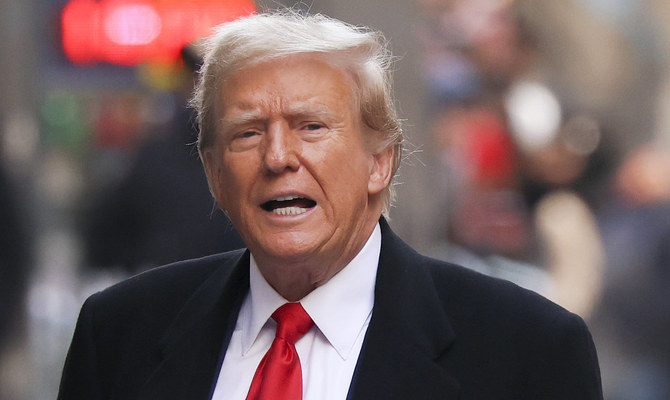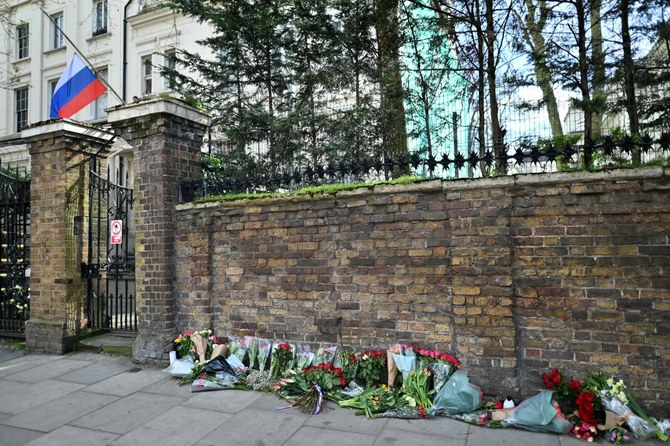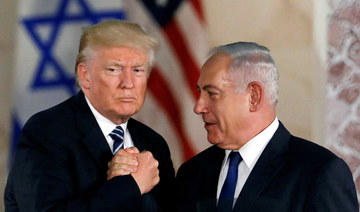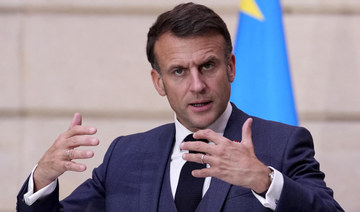Since the start of his political career, Donald Trump has played on stereotypes about Jews and politics.
He told the Republican Jewish Coalition in 2015 that “you want to control your politicians” and suggested the audience used money to exert control. In the White House, he said Jews who vote for Democrats are “very disloyal to Israel.”
Two years ago, the former president hosted two dinner guests at his Florida residence who were known to make virulent antisemitic comments.
And this week, Trump charged that Jewish Democrats were being disloyal to their faith and to Israel. That had many American Jews taking up positions behind now-familiar political lines. Trump opponents accused him of promoting antisemitic tropes while his defenders suggested he was making a fair political point in his own way.
Jonathan Sarna, American Jewish history professor at Brandeis University, said Trump is capitalizing on tensions within the Jewish community.
“For people who hate Donald Trump in the Jewish community, certainly this statement will reinforce their sense that they don’t want to have anything to do with him,” he said. “For people who like Donald Trump in the Jewish community, they probably nod in agreement.”
To many Jewish leaders in a demographic that has overwhelmingly identified as Democratic and supported President Joe Biden in 2020, Trump’s latest comments promoted harmful antisemitic stereotypes, painting Jews as having divided loyalties and that there’s only one right way to be Jewish religiously.
“That escalation of rhetoric is so dangerous, so divisive and so wrong,” said Rabbi Rick Jacobs, president of the Union for Reform Judaism, the largest US Jewish religious denomination. “This is a moment when Israel needs there to be more bipartisan support.”
But Matt Brooks, CEO of the Republican Jewish Coalition, said the former president’s comments must be heard in context of the Israel-Hamas war and Democratic criticisms of the state of Israel.
“What the president was saying in his own unique style was giving voice to things I get asked about multiple times a day,” Brooks said. “How can Jews remain Democrats in light of what is going on?” He contended the Democratic Party is “no longer the pro-Israel bastion it used to be.”
More than 31,800 Palestinians have been killed in the Israeli offensive that followed Hamas’ Oct. 7 attack on southern Israel, in which militants killed some 1,200 people and took hostages. Much of northern Gaza has been leveled, and officials warned famine is imminent.
Trump’s comments followed a speech by Senate Majority Leader Chuck Schumer, the country’s highest-ranking Jewish official. Schumer, a Democrat, last week sharply criticized Prime Minister Benjamin Netanyahu ‘s handling of the war in Gaza. Schumer called for new elections in Israel and warned the civilian toll was damaging Israel’s global standing.
“Any Jewish person that votes for Democrats hates their religion,” Trump retorted Monday on a talk show. “They hate everything about Israel.”
A cascade of Jewish voices, from Schumer to the Anti-Defamation League to religious leaders, denounced Trump’s statement.
In a statement to The Associated Press on Wednesday, the Trump campaign doubled down, criticizing Schumer, congressional Democrats’ support of Palestinians and the Biden administration’s policies on Iran and on aid to Gaza.
“President Trump is right,” said Karoline Leavitt, national press secretary for the Trump campaign.
Jeffrey Herf, an antisemitism expert at the University of Maryland, disagrees with Schumer’s call for a ceasefire in Gaza, but believes most Democrats support Israel — and he said a second Biden term would be better for it than a second Trump one.
“If (Trump) loses the 2024 election, his comments prepare the way for blaming the Jews for his defeat,” Herf said. “The clear result would be to fan the flames of antisemitism and assert that, yet again, the Jews are guilty.”
Sarna saw Trump as trying to appeal to politically conservative Jews, particularly the small but fast-growing Orthodox segment, who see Trump as a defender of Israel.
Also, about 10 percent of US Jews are immigrants, according to a 2020 Pew Research Center report. Sarna said significant numbers are conservative.
At the same time, Democrats face the tension between their Jewish constituency, which is predominantly pro-Israel, and its progressive wing, which is more pro-Palestinian.
Sarna said that while it may seem odd to focus so much attention on subsections of a minority population, “elections in America are very close, and every vote counts.”
Conservative commentator Ben Shapiro said Tuesday on his podcast that Trump “was making a point that, frankly, I have made myself, which is that Jews who are voting Democrat do not understand the Democratic Party.” Shapiro, who practices Orthodox Judaism, contended the party “overlooks antisemitism” within its ranks.
Rabbi Jill Jacobs, the CEO of T’ruah, a rabbinic human rights organization, said Trump has no business dictating who’s a good Jew.
“By insinuating that good Jews will vote for the party that is best for Israel, Trump is evoking the age-old antisemitic trope of dual loyalty — an accusation that Jews are more loyal to their religion than to their country, and therefore can’t be trusted,” she said. “Historically, this accusation has fueled some of the worst antisemitic violence.”
In his own time in office, Trump’s policy “of supporting Prime Minister Netanyahu and the settler agenda only endangered Palestinians and Israelis and made peace more difficult to achieve,” Jacobs said.
Pittsburgh-based journalist Beth Kissileff — whose husband, a rabbi in the Conservative denomination of Judaism, in 2018 survived the nation’s deadliest antisemitic attack — said it was highly offensive for Trump to be a “self-appointed arbiter” of what it means to be Jewish.
“Chuck Schumer had every right to say what he said,” Kissileff added. “Just because we’re Jews, it doesn’t mean we agree with everything the (Israeli) government is doing. We have compassion for innocent Palestinian lives.”
Brooks, of the Republican Jewish Coalition, defended the former president against antisemitism charges, pointing to his presidential record as an example of proof.
Trump pursued policies that were popular among American Christian Zionists and Israeli religious-nationalists, including moving the US embassy to Jerusalem and supporting Jewish settlements in occupied territories. His daughter Ivanka is a convert to Orthodox Judaism, and her husband and their children are Jewish. The couple worked as high-profile surrogates to the Jewish community during Trump’s administration.
Trump’s core supporters include white evangelicals, many of whom believe the modern state of Israel fulfills biblical prophecy. Prominent evangelicals who support Zionism have also been criticized for inflammatory statements about Jewish people.
Sixty-nine percent of Jewish voters in 2020 supported Biden, while 30 percent supported Trump, according to AP VoteCast, a survey of the electorate conducted in partnership with NORC at the University of Chicago. That made Jewish voters one of the religious groups where support for Biden was strongest. Also, 73 percent of Jewish voters in 2020 said that Trump was too tolerant of extremist groups.
Rabbi Bradley Shavit Artson said Trump’s comments are “in a complex middle zone” — not explicitly antisemitic, but reliant on such tropes.
American Jews base their votes on a complex mix of issues and values, “among them inclusion, diversity, climate change, civil rights,” said Artson, a leader within Conservative Judaism. “While they love Israel diversely, many of us also care about the wellbeing and self-determination of Palestinians.”
US Jews upset with Trump’s latest rhetoric say he doesn’t get to tell them how to be Jewish
https://arab.news/b3gg7
US Jews upset with Trump’s latest rhetoric say he doesn’t get to tell them how to be Jewish

- Trump’s core supporters include white evangelicals, many of whom believe the modern state of Israel fulfills biblical prophecy
AstraZeneca to withdraw COVID vaccine globally as demand dips

- AstraZeneca says initiated worldwide withdrawal due to “surplus of available updated vaccines”
- Drugmaker has previously admitted vaccine causes side effects such as blood clots, low blood platelet counts
AstraZeneca said on Tuesday it had initiated the worldwide withdrawal of its COVID-19 vaccine due to a “surplus of available updated vaccines” since the pandemic.
The company also said it would proceed to withdraw the vaccine Vaxzevria’s marketing authorizations within Europe.
“As multiple, variant COVID-19 vaccines have since been developed there is a surplus of available updated vaccines,” the company said, adding that this had led to a decline in demand for Vaxzevria, which is no longer being manufactured or supplied.
According to media reports, the Anglo-Swedish drugmaker has previously admitted in court documents that the vaccine causes side-effects such as blood clots and low blood platelet counts.
The firm’s application to withdraw the vaccine was made on March 5 and came into effect on May 7, according to the Telegraph, which first reported the development.
The Serum Institute of India (SII), which produced AstraZeneca’s COVID-19 vaccine under the brand name Covishield, stopped manufacturing and supply of the doses since December 2021, an SII spokesperson said.
London-listed AstraZeneca began moving into respiratory syncytial virus vaccines and obesity drugs through several deals last year after a slowdown in growth as COVID-19 medicine sales declined.
Ex-national security adviser criticizes UK PM for not suspending arms sales to Israel

- Lord Peter Ricketts: ‘Pity’ govt ‘could not have taken a stand on this and got out ahead of the US’
- American decision to pause delivery of weapons seen as warning to Israel to abandon or temper plan to invade Rafah
LONDON: A former UK national security adviser has condemned Prime Minister Rishi Sunak for failing to suspend weapons sales to Israel, The Independent reported on Wednesday.
After the US paused a delivery of bombs, Sunak has yet to follow suit despite mounting pressure from within his own Conservative Party.
Lord Peter Ricketts, a life peer in the House of Lords and retired senior diplomat, said Britain should have been “ahead of the US” in ending arms sales to Israel.
The US decision to pause the shipment of bombs is seen as a warning to Israel to abandon or temper its plan to invade Rafah in southern Gaza.
More than 1 million Palestinian civilians are sheltering in the city after being forced out of northern sections of the enclave.
Ricketts said it is a “pity” that “the government could not have taken a stand on this and got out ahead of the US.”
Conservative MP David Jones made the same call in comments to The Independent, saying: “We should give similar consideration to a pause.”
He added: “Anyone viewing the distressing scenes in Gaza will want to see an end to the fighting. Hamas is in reality beaten. Now is the time for diplomacy to bring this dreadful conflict to an end.”
At Prime Minister’s Questions in the House of Commons, Sunak faced a flurry of questions over Britain’s potential ties to an Israeli invasion of Rafah. He said the government’s position remains “unchanged.”
Taliban deny Pakistani claims of Afghan involvement in attack on Chinese workers

- According to Islamabad, suicide attack that killed 5 Chinese in Pakistan was planned in Afghanistan
- Afghan Defense Ministry says the March attack showed weakness of Pakistan’s security agencies
KABUL: The Taliban on Wednesday rejected allegations of Afghan involvement in a recent deadly attack on Chinese workers in neighboring Pakistan.
The five Chinese nationals, who were employed on the site of a hydropower project in Dasu in northwestern Khyber Pakhtunkhwa province bordering Afghanistan, were killed alongside their driver in a suicide blast on March 26.
Pakistan’s military said on Tuesday that the attack was planned in Afghanistan and that the suicide bomber was an Afghan citizen.
Maj. Gen. Ahmad Sharif, a spokesperson for Pakistan’s army, also told reporters that Islamabad had “solid evidence” of militants using Afghan soil to launch attacks in Pakistan, that since the beginning of the year such assaults had killed more than 60 security personnel and that authorities in Kabul were unhelpful in addressing the violence.
The Taliban’s Ministry of Defense responded on Wednesday that the claims were “irresponsible and far from the reality.
“Blaming Afghanistan for such incidents is a failed attempt to divert attention from the truth, and we strongly reject it,” Enayatullah Khwarazmi, the ministry’s spokesperson, said in a statement.
“The killing of Chinese citizens in an area of Khyber Pakhtunkhwa, which is under tight security cover of the Pakistani army, shows the weakness of the Pakistani security agencies or cooperation with the attackers.”
The Dasu attack followed two other major assaults in regions where China has invested more than $65 billion in infrastructure projects as part of its wider Belt and Road Initiative.
On March 25, a naval air base was attacked in Turbat in Pakistan’s Balochistan province, and on March 20, militants stormed a government compound in nearby Gwadar district, which is home to a Chinese-operated port.
Pakistan is home to twin insurgencies, one by militants related to the Tehreek-e-Taliban Pakistan — the Pakistani Taliban — and the other by ethnic separatists who seek secession in southwestern Balochistan province, which remains Pakistan’s poorest despite being rich in natural resources.
While the attacks in Balochistan were claimed by the Baloch Liberation Army — the most prominent of several separatist groups in the province, no group claimed responsibility for the one in Dasu.
Blaming it on Afghanistan, however, was “baseless,” according to Naseer Ahmad Nawidy, an international relations professor at Salam University in Kabul.
“The insurgency in the region has existed for very long now and cannot be attributed to a specific area or country. Pakistan looks at the Islamic Emirate in its current form as a threat to its interests. The Pakistan government needs to develop its relations with the Islamic Emirate based on equal rights and goodwill for stability in the whole region,” Nawidy told Arab News.
“Stability in the region requires mutual cooperation and trust. The governments in Afghanistan and Pakistan must end the relations crisis at the earliest. Repeating such claims will further increase the tensions and may cause enmity between the two countries.”
Abdul Saboor Mubariz, a political scientist and lecturer at Alfalah University in Jalalabad, said that Pakistan’s claims were meant to put pressure on the Taliban to help Islamabad in its campaign against the TTP.
“Pakistan’s government is using different forms of pressure such as forcible deportation of Afghan refugees, claims about security threats from Afghanistan, closing border points and creating challenges for Afghan traders,” he said, adding that accusations and claims of links to attacks were affecting the Taliban administration as it still sought recognition from foreign governments.
“The claims are critical for the Islamic Emirate as it is seeking engagement with the countries in the region and across the globe, while the government remains unrecognized by all world countries.”
India PM Modi’s party deletes X post accused of targeting Muslims

- Video featured opposition politicians scheming to abolish programs for marginalized Hindus, distribute them to Muslims
- India’s PM Modi, expected to win polls, has made controversial remarks in election speeches, referring to Muslims as “infiltrators”
New Delhi: Indian Prime Minister Narendra Modi’s party on Wednesday deleted a cartoon video posted on social media platform X that was criticized for targeting minority Muslims during an ongoing national election.
India’s election code bans campaigning based on “communal” incitement but the Hindu-nationalist Bharatiya Janata Party (BJP) has frequently invoked the country’s main religious divide on the campaign trail.
The video, posted by an official BJP account, featured caricatures of opposition politicians scheming to abolish special affirmative action programs for marginalized Hindu groups and instead distribute them to Muslims.
The election commission wrote to the platform’s Indian office on Tuesday saying the “objectionable” post violated Indian law.
On Wednesday the original post had disappeared from the platform, with a notice saying it had been deleted.
A police complaint filed by the opposition Congress party accused the video of promoting “enmity between different religions.”
Modi, who is widely expected to win a third term in office when the six-week general election concludes next month, has made similar claims to the video in campaign appearances since last month.
He has used public speeches to refer to Muslims as “infiltrators” and “those who have more children,” prompting condemnation from opposition politicians, who have complained to election authorities.
On Tuesday he again said that his political opponents would “snatch” affirmative action policies meant for disadvantaged Hindus and redirect them to Muslims.
Modi remains widely popular a decade after coming to power, in large part due to his government’s positioning of the nation’s majority faith at the center of its politics, despite India’s officially secular constitution.
That in turn has made India’s 220-million-plus Muslim population increasingly anxious about their future in the country.
The BJP last month published another contentious animated video on Instagram in which a voiceover warned that if the opposition came to power, “it will snatch all the money and wealth from non-Muslims and distribute them among Muslims, their favorite community.”
The video was removed after several users reported it for “hate speech.”
UK says to expel Russian defense attache as ‘undeclared military intelligence officer’

- Interior minister James Cleverly told parliament the UK would also remove the diplomatic status of several Russian-owned properties
- UK is currently a staunch NATO backer of Ukraine
London: The UK government on Wednesday raised tensions with the Kremlin by announcing it would expel a Russian defense attache for being “an undeclared military intelligence officer.”
Interior minister James Cleverly told parliament the UK would also remove the diplomatic status of several Russian-owned properties, including one in Sussex, southern England, and another in London “which we believe have been used for intelligence purposes.”
There would also be new restrictions on Russian diplomatic visas such as a cap on the length of time Russian diplomats can spend in the UK, he added.
The move comes with the UK concerned at an apparent increase in “malign” Russian activity on UK soil, including an arson attack on a Ukrainian-linked business allegedly orchestrated by the Kremlin.
A British man who it is claimed has links to the Wagner Group was charged in connection with that case last month.
London has previously accused Moscow of being behind the poisoning of two Russian former agents on UK soil, and of a spate of cyberattacks and disinformation campaigns.
The UK is currently a staunch NATO backer of Ukraine, providing training for troops and military equipment in the fightback against Russia.
Cleverly said the new package of measures was intended “to make clear to Russia that we will not tolerate such apparent escalations.”
He warned that Moscow would make accusations of Russophobia and spread conspiracy theories in response to his announcement.
“This is not new and the British people and the British Government will not fall for it, and will not be taken for fools by (President Vladimir) Putin’s bots, trolls and lackeys.
“Russia’s explanation was totally inadequate. Our response will be resolute and firm.
“Our message to Russia is clear: stop this illegal war, withdraw your troops from Ukraine, cease this malign activity.”

















